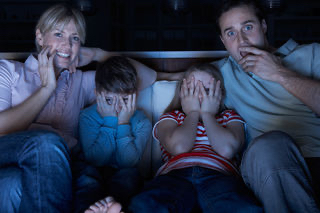Watching A Scary Movie? Read This First

The horror genre tends to trigger hormone imbalances.
February 12, 2023
You hide behind your blanket and obstruct your vision just enough to see a figure moving sluggishly in your screen’s foreground. The ominous music stops for a moment. You think you’re safe and lower your blanket. Bam! Poltergeist on your screen. Your heart speeds up before calming down, and you continue watching and have it happen again. It seems counterintuitive to actively crave fear, but studies show that the stimulation of hormones and our fight or flight system, as a result of these scary images, give viewers a heightened sense of euphoria and awareness of their surroundings. Unfortunately, for many watchers, the fun, lighthearted experience ends with the movie while the anxiety and paranoia prevail.
When someone sits down and gets ready for a scare, they are deliberately searching for that activated fight or flight sensation. While it’s easy to deem the craving as strange and slightly concerning, science helps settle horror junkies and their moral compasses. Penn Medicine explains the chemical process of that feeling of adrenaline when the defense system is activated. “Fight or Flight: The Science of Fear… and Why We Like Scary Movies” explains that in moments of distress and heightened danger, even when simulated, “stimulus triggers your amygdala … [and] alerts the hypothalamus, which sends a message to the adrenal glands … the ‘action’ hormone.” This mechanism physically affects your oxygen intake; the piece details the airways opening in a watcher’s lungs, resulting in heightened versions of all their senses.
While having the “action” hormone pumped throughout the audiences’ bodies results in an exhilarating sensation, it doesn’t quite know when to turn itself off or how to differentiate, say, a killer doll from your little sibling. When the body is being fed a stressful situation, it will interpret the stress as life-threatening. That’s where the familiar feeling of running up the stairs after the lights have been turned off comes from; an irrational fear due to an intense moment of stress. The Avalon Malibu’s “Can Watching A Violent Movie Cause Someone To Develop PTSD?,” writes, “Cultivation theory posits that those who watch television often and in substantial amounts tend to adopt the perceptions of what they see on TV … if a person spends many hours a day watching scary movies, they may eventually come to believe that the world is a scary place and … fear leaving their home.” While watching scary movies most likely will not cause PTSD, witnesses can exhibit certain post-traumatic symptoms as a result of any disturbing images, often lasting well into their adulthood.
Hormone imbalance is the first drop in the ripple effect of health. Regulating content that spikes adrenaline can reduce anxiety long term and, consequently, benefit the body physically. The most important thing to remember is that everyone’s brains work differently, and a long-term distraction could be reminiscent of striking gold for some horror movie fans. As a life-long advocate for romantic comedies, all I can say is: know your brain and own your boundaries!
This article also appears in our January 2023 print edition.








